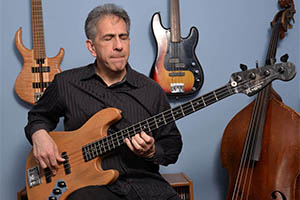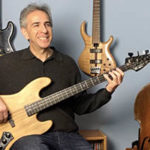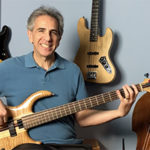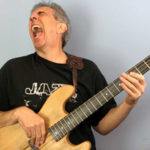Bringing out the emotional impact of every note
By Jon Liebman
Week of June 1, 2020
When learning bass, one topic that continually frustrates students is music theory. Everybody acknowledges that theory is important. They know they need to learn it, and they want to learn it. The problem lies in the disconnect between understanding theory and knowing how to apply it to making music.
One person who has a lot to say on the subject is Alain Caron, my featured interviewee this week on For Bass Players Only. Alain has been immersed in music and bass for decades. The longtime leader of the popular Canadian fusion band, UZEB, Alain is also a passionate music educator, frequently covering the topic with his students.
“I noticed that all students and all beginners are so afraid of theory,” he observes. “They say theory is too intellectual, (and that) music has to be played with heart, with feeling.”
“Of course it does!” Alain concurs. But his thinking goes deeper. “I see music as a language,” he says, “so I decided I’m not going to play one note (if) I don’t know the reason I play that note, the function of that note in the chord, and the harmony, the emotional impact of that note.”
In other words, learning theory has a direct impact on your ability to make your music sound more meaningful and heartfelt. At For Bass Players Only, in addition to all the courses on Jazz, Blues, Funk, Latin, and all the other genres, students learning bass here have made Scales & Theory one of the most popular courses on the site. I’m constantly hearing from FBPO students about how much their grasp of theory is helping them with their grooving, soloing, and ability to build bass lines.
(new window)
Theory is important when making music, and so is emotion. Alain sums it up with a great analogy: “You can learn all the words in the dictionary, but it won’t make you a poet. You can still say stupid things, so you need both. You need the theory, but you need to have something to say.”
How about you? Have a thought on the subject? Leave a comment below and let me know what you think. In the meantime, check out my interview with Alain here.






I definitely agree with his dictionary analogy. Musical literacy enables us to not only better convey what it is we’re trying to express cohesively, but also helps us to communicate with other musicians more efficiently and effectively.
I have played Bass about 20 years. I am stuck in the basics I have been got most of that. I know some theory such as the major scale and circle of fifths. I see where any of that effects my Bass playing much. I seem to learn best by patterns and shapes and play pretty much in blocks..starting on a rooting and running half way down the neck has never made much sense to me…it’s seems I have found it you just running around looking for it then trying to get back to where you started. Impressive to everybody but who you playing with. I would like to play more then root,fifth and octave. Or simple blues box patterns.
Without theory, a musician is like a parrot. They can make the sounds of a language, but they don’t understand it.
I love learning music theory. I find it fascinating to understand the science behind the art of music.
I try to focus on reading the score and avoid tabs. The staff notation and the chord changes as well as any other notes and information such as playing (two eighth notes = long and short. Or triplets) all add to make playing less mechanical, any thing to note the feel of the song.
The chord changes help to identify the II-V7-I and knowledge of scales and arpeggios makes music theory a great lesson in playing ability
I used to hate when some of the older dudes would tell me… In order to solo…First, “you gotta have something to say”… and they would NEVER tell me what the hell that means!
However, using Alain’s example… you can learn every word in the dictionary & you can have a master degree in English…BUT, that won’t make you a Poet or a Writer!!!
You can just turn on that laptop and stare at that BLANK screen for hours!
So, it’s twofold… learning where every note is on your base, along with music theory (and proper technique) will allow you to transfer your musical ideas from your head to your bass!
That’s IF you have something to say!